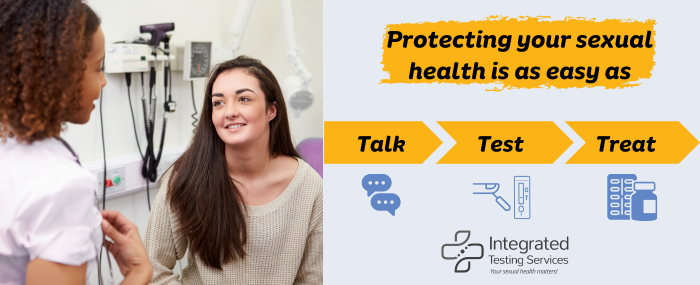
Free - Fast - Confidential
Johnson County Public Health (JCPH) currently offers HIV, Hepatitis C, Syphilis, Gonorrhea, & Chlamydia testing to all individuals.
We offer testing by appointment or walk-ins during select hours. For more information or to schedule an appointment please call our office at 319-356-6042.
Walk-in Hours:
- Mondays & Fridays 8:30 am - 3:30 pm
- Wednesdays 8:30 am - 6 pm
Funding for JCPH’s Integrated Testing Services is provided, in part, by the Iowa Department of Health and Human Services
- Human Immunodeficiency Virus (HIV)
HIV is transmitted by blood-to-blood contact, breastmilk, semen, or vaginal secretions. This virus attacks a person's immune system, making them more vulnerable to other types of infections.
If left untreated, HIV can lead to Acquired Immunodeficiency Syndrome (AIDS). Currently, there is no cure or vaccine for HIV, but better-quality medical treatment now allows People Living With HIV (PLWH) to have full and healthy lives.
HIV Information: https://www.cdc.gov/hiv/default.html
PrEP Information: https://www.prepiowa.org/Ways to Prevent HIV:
- Pre-Exposure Prophylaxis (PrEP)
- Post-Exposure Prophylaxis (nPEP)
- Use protection during sexual activity. (e.g., condoms, dental dams, other barrier methods, etc.)
- Get Tested
Who Should Get Tested?
Anyone who is sexually active should get tested for STI's. However, if a person meets one or more of the following criteria, we strongly encourage them to get tested regularly.
- Anyone over the age of 12
- A man who has sex with other men (MSM)
- A person testing positive for a sexually transmitted disease
- A person with a history of injection drug use
- Hepatitis C (HCV)
HCV is primarily transmitted by blood-to-blood contact. HCV is a national epidemic and kills more people than the next sixty leading infectious diseases, combined.
If left untreated, HCV can lead to more serious health problems, including, liver damage, cirrhosis, liver cancer, and death.
Hepatitis C Information: https://www.cdc.gov/hepatitis/hcv/index.htm
Ways to Prevent HCV:
- Avoid Blood-to-Blood Contact
- Do not share syringes and/or injection drug equipment
- Use protection during sexual activity (e.g., condoms, dental dams, other barrier methods, etc.)
- Get Tested
Who Should Get Tested?
Anyone who is sexually active should get tested for STI's. However, if a person meets one or more of the following criteria, we strongly encourage them to get tested regularly.
- Those who currently or have ever injected drugs
- Those who were born between 1945 and 1965
- Those who received a blood transfusion or organ transplant before 1992
- People living with HIV
- Syphilis
Syphilis is transmitted by direct contact with a syphilis sore during vaginal, anal, or oral sex. Syphilis can also be spread from a mother with Syphilis to her unborn baby (Congenital Syphilis).
If left untreated, Syphilis can cause serious health effects that can show up years later.
Ways to Prevent Syphilis:
- Use protection during sexual activity (e.g., condoms, dental dams, other barrier methods, etc.)
- Get Tested
Who Should Get Tested?
Anyone who is sexually active should get tested for STI's. However, if a person meets one or more of the following criteria, we strongly encourage them to get tested regularly.
- People who are pregnant
- A man who has sex with other men (MSM)
- People who are taking PrEP for HIV prevention
- People living with HIV and are sexually active
- Gonorrhea
Gonorrhea is transmitted by having vaginal, anal, or oral sex with someone who has gonorrhea. A mother with gonorrhea can give the infection to their baby during childbirth.
If left untreated, gonorrhea can cause serious, and sometimes permanent health problems. It can cause pelvic inflammatory disease (PID) if untreated in women and can lead to infertility in men and women.
Ways to Prevent Gonorrhea:
- Use protection during sexual activity (e.g., condoms, dental dams, other barrier methods, etc.)
- Get Tested
Who Should Get Tested?
Anyone who is sexually active should get tested for STIs. However, if a person meets one or more of the following criteria, we strongly encourage them to get tested regularly.
- People who are pregnant
- Men who have sex with other men (MSM)
- Women younger than 25 who are sexually active
- If you have new or multiple sex partners
- Chlamydia
Chlamydia is transmitted by having vaginal, anal, or oral sex with someone who has chlamydia. A mother with chlamydia can give the infection to their baby during childbirth.
If left untreated, chlamydia can cause permanent damage to a woman's reproductive system, making it hard or impossible to get pregnant later.
Ways to Prevent Chlamydia:
- Use protection during sexual activity (e.g. condoms, dental dams, other barrier methods, etc.)
- Get Tested
Who Should Get Tested?
- People who are pregnant
- Men who have sex with other men (MSM)
- Women younger than 25 who are sexually active
- If you have new or multiple sex partners
Additional Resources:
- Sexual Health 101: https://www.healthysexuals.com/
- Harm Reduction Resources
- Iowa Department of Health and Human Services
- CDC STIs
- State of Iowa Hepatitis C Virus (HCV) End-of-Year 2020 Surveillance Report, 2020 - Iowa Publications Online
- Iowa HHS Hepatitis Program
- Iowa HHS HIV/AIDS program
- TelePrEP
If you are a client in need of Family Planning services, you can find Title X clinics in the area on the Office of Population Affairs website's Title X Locator.
